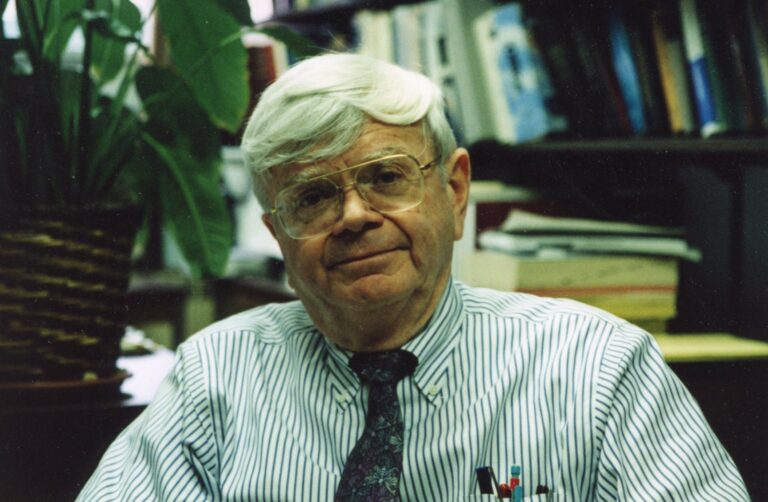The Case Western Reserve University community is mourning the loss of emeritus chemical engineering faculty member John Angus, who died late last month. He was 88.
Angus, who served the university for more than 40 years, was one of four faculty members hired in 1963 to restart the Department of Chemical Engineering at Case Institute of Technology. In the decades to follow, Angus served as an interim dean of engineering, and he was chair/co-chair of the department twice.
His most well-known research—which led to his induction into the National Academy of Engineering—was in the area of metastable diamond synthesis. He pioneered a novel method of low-pressure growth of diamond which was met with great skepticism; yet, he showed atomic hydrogen to be critical to establishing conditions in which diamond growth would be favored.
Uziel Landau, an emeritus chemical engineering faculty member who knew Angus for 47 years, said Angus’ discovery was so revolutionary that initially he had a hard time publishing papers on the topic.
“Only after duplicate studies from around the world validated his discovery, he became known as the discoverer of low-pressure diamond growth—an approach that opened an entirely new area in science and technology,” Landau noted.
Among his many focus areas, Angus also pioneered development of related “diamond-like carbon” hard films that now are used in several commercial products. He was one of the first to publish on boron-doping of diamond during growth to create electrically conductive diamond, and then, years later, characterized these films as electrodes with exceptional properties.
“This area is one of the main application areas of diamond today,” said Heidi Martin, an associate professor in the department who knew Angus for 30 years. “Even while emeritus, [John] continued to publish experimental and computational studies involving electrochemical charge transfer at surfaces.”
Martin—who described Angus as the most important person in her professional life—first became acquainted with the professor when he was her primary research advisor, initially for undergraduate research, and then for graduate work (where Martin was co-advised by Landau).
Angus and Martin then became faculty colleagues at the university, where Angus was active in educational reform and worked to expand opportunities for women in engineering.
“I was the first female faculty member when he, as co-chair, hired me,” Martin noted. “He told me that his wife said, ‘It’s about time.’
“I don’t think I can adequately describe his impact on the university—his positive influence on so many people over the years,” Martin continued. “I like to think that he set a bar for how we should be as faculty colleagues and mentors.”
During his time at the university, Angus mentored 50 other PhD and master’s students, and was known to keep in touch with them well after they graduated, often meeting up with them during his travels around the world to places such as Japan and South Africa.
His students even coined a term for his witty “Angus-isms,” which were phrases “that were often funny, but also insightful,” according to Martin.
“His well-known mantra was ‘Onward and upward,’” she said. “On his office door for many years was a sign that said ‘Old age and treachery will overcome youth and skill.’”
Besides his cleverness and technical knowledge, Angus’ integrity and insight were known to be impeccable—along with his professional style (not to be confused with his sharp wardrobe).
“He knew how to respect and appreciate people, and thus, he would always listen, and was encouraging and supportive—even when he had to be relentless with the red pen,” Martin added.
Landau, who was hired by Angus as an associate professor of chemical engineering more than four decades ago, said a telling aspect of Angus’ personality was the way he reviewed Landau’s early proposals and papers, and students’ writings in general.
“Instead of just marking or erasing statements that he found deficient, John would write long-hand, alternative sentences,” Landau said of his mentor, research collaborator and “cherished friend.” “As a result, some of my pages reviewed by John had more of his writing than my original drafts. However, this provided me and his students with the opportunity and great benefit to learn how to write more effectively, rather than just being criticized.”
Angus attended the University of Michigan, where by 1960 he had earned bachelor’s, master’s and PhD degrees in chemical engineering. Along with his induction to the National Academy of Engineering, his career saw a number of other honors—including being a fellow of both the American Institute of Chemical Engineerings and the Electrochemical Society.
In addition to his academic achievements, Angus was deeply involved with the Ohio Scottish Games, including serving as its chairman for several years. Martin said he stayed true to his Scottish roots, “albeit never seen in a kilt.”
Angus, whose wife of 63 years, Caroline, passed away four years ago, is survived by his brother Charles (wife Laurel), children, Lorraine, and Charles (wife Shannon), grandchildren, and former son-in-law Sam Hubish. He also leaves behind other family members, including nieces and nephews, as well as a host of friends, colleagues and students.
Read Angus’ full obituary. A memorial service will be held at 2 p.m. Saturday, March 4, at Judson Manor, 1890 E. 107th St., Cleveland OH 44106.
Students who would like support during this time are encouraged to contact University Health and Counseling Services at 216.368.5872. This line is staffed by a counselor 24 hours a day, seven days a week. Faculty and staff can access counseling at any time by calling IMPACT Solutions at 1.800.227.6007.

